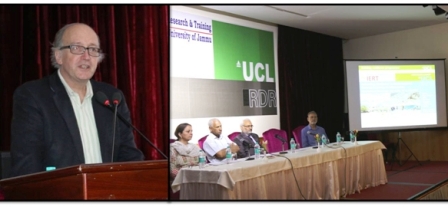| News Details |
| International workshop on Increasing Resilience to Environmental Hazards in Border Conflict Zones inaugurated | | 
Leh,July 10, (Scoop News)- The Institute of Energy Research and Training (IERT), and Postgraduate Department of Geology, University of Jammu, and Institute for Risk and Disaster Reduction (IRDR), University College London (UCL) organized a two-day workshop in the Grand Dragon Hotel – Ladakh. The workshop was attended by the invited speakers and other delegates from India, Afghanistan, Bangladesh, Bhutan, France, Germany, Italy, Nepal, Spain, the UK and the USA.
This workshop focuses on building resilience in frontier conflict zones subjected to multiple environmental hazards. The rationale is that resilience can be addressed through understanding the hazard risks and the heightened vulnerabilities of the people in the context of knowledge of the history of disasters and analysis of the impact of conflict on social relations.
Prof. R. D. Sharma, Vice-Chancellor, University of Jammu and Chief-Guest of the event inaugurated the workshop. The other guests present were Prof Peter Sammonds (IRDR-UCL), Prof G. M. Bhat, Institute of Energy Research and Training (IERT), University of Jammu, Dr. Bindra Ban Thusu, IERT and UCL, and Prof. Renu Nanda, Department of Education, University of Jammu.
In this session the purpose and goals of the workshop were highlighted. The project is aimed at building resilience to environmental hazards for communities in border conflict zones in northern India by employing a co-produced approach among natural, social and historical sciences. This will examine how change in social relations, conflict and migration affects social capital and people’s vulnerability to environmental hazard risks. In this context the specific objectives of this project are to examine the historical evolution of the landscape, hazards drivers and human impact; assess the vulnerabilities and social capital of communities in border conflict zone, their cross-borders links, relations with other communities and migration ; analyse the history of disasters, disaster diplomacy and the cultural and political developments in a border zone, assessing the retrospective impact of conflict on resilience, approaches to disaster risk reduction, disaster recovery and adaptation and the goal is to produce an integrated historical, social, cultural and natural science methodology for building resilience to environmental hazards in border conflict zones, identifying the pathways and gaps in order to make the greatest impact of the research in such areas.
Professor R. D. Sharma, Vice-Chancellor, University of Jammu in his address appreciated the initiative taken by the IERT, JU and UCL over the past decade to make the societies resilient to the various types of natural environmental hazards. He also congratulated the people of the region for co-operating with the scientists visiting the Nubra Valley and Leh. The research teams from the University of Jammu comprised the faculties of Departments of Geology, Education, Sociology, Political Science and Lifelong Learning and scientists from UCL, ODI and other institutions in Europe and USA who reached the previously unreached sections of the Nubra-Shyok Valley in order to make rural societies more resilient to environmental hazards. The Vice-Chancellor congratulated the teams for their commendable work which has direct implication on the societies.
Earlier, Professor Bhat gave an overview on the potential physical hazards in the region. Professor Peter Sammonds highlighted the objectives of the international workshop and future plans. Dr. Bindra Thusu from UCL narrated the history of the scientific activities of the IERT and UCL collaborations over the past decade and its impact on the society.
The first session was chaired by Prof. Juergen Thurow (UCL). In this session four presentations were delivered; Mr. Gareth Hearn from Hearn Geoscience delivered a report on Geohazards in Leh area; Prof. G. M. Bhat deliberated on the Natural Hazards in Ladakh; Dr. Naveen Hakhoo (IERT, University of Jammu, presented a field report on the Geological Drivers of Hazards in Shyok-Nubra Valley; and two presentations were delivered on Forensic Workshop Disaster Management by Mr. Bayes Ahmed (UCL) and Dr. Virginie La Masson (ODI, London).
The second session was chaired by Prof. Sundeep Pandita, Department of Geology, University of Jammu. In this session Prof. Renu Nanda presented key-note lecture on Resilience Education and Emergency Planning for Schools; Dr. Alejandra Albuerne (UCL-CEGE) and Sonja Mueller (UCL-IRDR) presented a field report on Safer Schools and Safer Healthcare, the session ended with video presentation and discussion on Ladakh Cultural Fieldwork by Prof. Kavita Suri, University of Jammu.
Third session of the work-shop was chaired by Prof Peter Sammonds. In this session, key note lecture was presented by Mr. Moses Kunzang, Additional Deputy Commissioner, LAHDC, Leh and Prof Tashi Ldawa (EJM College) on Ladakh Disaster Management Plan. The keynote lecture was followed by panel discussions on Hazards and Resilience.
The day was concluded by the poster presentations on Participatory Hazard and Dream Mapping.
... |
| |
|
|
Share this Story |
|
|
|
|
|
|
|
| |
|
|
| |
|
|